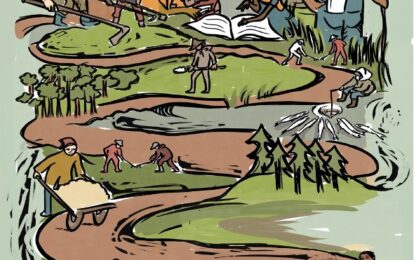ORFC 2026 8 – 9 Jan
ORFC 2026 8 – 9 Jan
Immerse yourself in a soundscape curated by the Landworkers' Radio and Farmerama. In this interactive, drop-in session, we invite you to listen to our audio exhibition exploring the topic of land justice, and consider questions and prompts around the room.
This session is a journey of stories told by four farmers about what land means to them and how they are fighting to defend their right to it. They will show why land is common, not a commodity, and people, not corporations, must be able to enjoy it.

Farms don’t just grow food, they grow opportunity. Research shows that communities surrounded by small farms benefit economically, as small farms circulate income among local establishments and generate jobs. The Hutson-Kadara family is using the power of farming to create opportunities for their town. Allensworth - located in California’s Central Valley - is a small, rural town whose promising trajectory as a Black agricultural haven was dashed by racism in the early 1900s. Today, the…
Building on the successful launch of the Sustainable Food Trust’s Feeding Britain from the Ground Up report in June, this session will explore the need to speed up the transition to more resilient and regenerative food and farming systems and reduce public confusion about healthy and sustainable diets. The panel will focus on how we can align what we eat with the output of genuinely sustainable farming systems, and explore what’s needed to enable this…

From silver back pumpkin in Hertfordshire to some of the world’s hottest chilli varieties in Dorset, this session will explore growing and marketing crops not usually found in the British context. Head grower at Woodoaks Farm, Rickey has ambitious plans to grow exotic fruit, amaranth, silver back pumpkin, mushrooms and micro greens. His Caribbean heritage and journey through different growing systems has given him interesting insight on what works. We will also hear from Woodoaks…

In a time of multiple food system and societal crises, progressive actors can see years of hard work campaigning, piloting new systems, and researching new policy solutions wiped out instantaneously. Reactionary politics is driving the abandonment and obstruction of long-term planning, in favour of further transfers of wealth to corporate interests. In the meantime, structural problems baked into our food system, and the resulting harms to human and environmental health, continue to exacerbate. Join Feedback…
The session will reflect on two year of the Fringe Farming project, which aims to grow the movement for agroecological food production at city peripheries. The panel will share their experiences and lessons learned in advocating for the importance of market gardens.
Agroecology has reached a tipping point - it is being challenged to be drawn into the mainstream, or remain an outsider movement. Moving from the outside without losing the radical values and vision is a major challenge, and is key to the political, policy and practical implementation of the agroecological vision.
Nature does not do simplified landscapes and monocultures. But our quest for specialisation has led to farms comprising minimal enterprises which in turn put soils and ecosystems under extreme pressure and are economically marginal. Turning this on its head, the session will open with a framing of the concepts of ecoregion potential, steady states and transitions, opening up a wide choice of tools available to land managers and how these allow for the optimisation of…